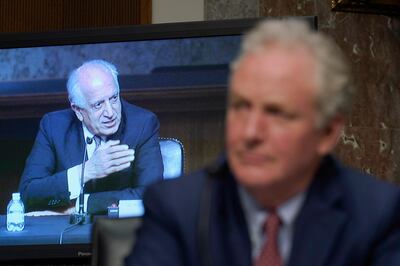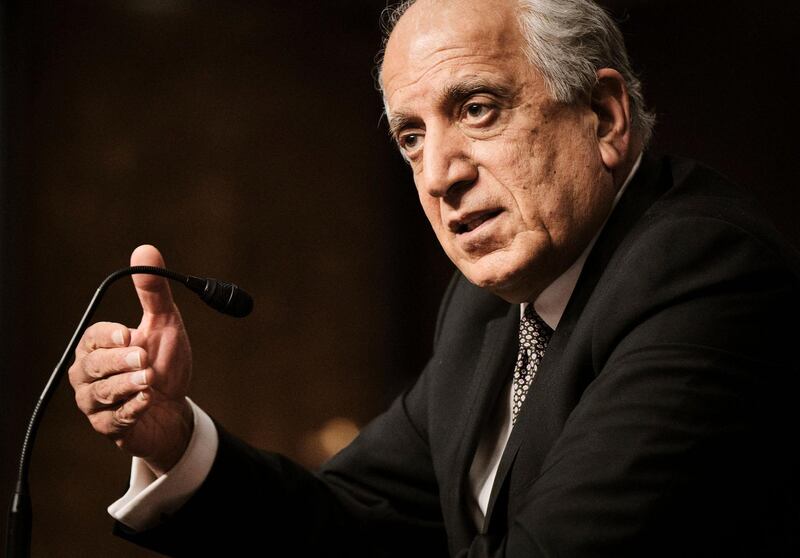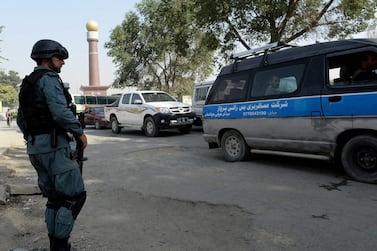President Joe Biden's administration has pledged to continue foreign aid to Afghanistan after US forces leave, but now Congress is threatening to withhold assistance if the Taliban squash hard-won freedoms as part of a future Afghan government.
“I don’t believe under any circumstances that the United States Senate will support assistance to Afghanistan, especially under the World Bank’s programme ... if the Taliban has taken a governing role that ends civil society advances and roles back women’s rights," Senate Foreign Relations Committee chairman Bob Menendez said on Tuesday.
Speaking at a public hearing to US special envoy to Afghanistan Zalmay Khalilzad, he added Congress would likely not "bend on that point."
Chris Coons, who chairs the foreign aid spending panel, and James Risch, the top Republican on the committee, both backed Mr Menendez’s calls to use US aid as leverage over the Taliban -- whether the Islamist insurgents achieve that goal through force or a negotiated political settlement with the Kabul-based government.
“I’m concerned about our ability to successfully implement what have been for 20 years robust assistance programmes to support the development of Afghanistan and the Afghan people," Mr Coons told Mr Khalilzad.
“Speaking for myself, I will continue to support robust development assistance for the Afghan government and the Afghan people, but not if there is a takeover by the Taliban and they break some basic commitments to respecting the role of women and fundamental human rights and democratic process.”
Secretary of State Antony Blinken last week said the Biden administration would work with Congress to release approximately $300 million in civilian assistance for Afghanistan that the United States pledged at a donor’s conference in November.
“We would be better off holding onto our $300 million right now until we see which way it’s going,” said Mr Risch, referring to the potential for the Taliban to exert more control over Afghanistan after the US withdrawal.
“Any congressional approval of further assistance to Afghanistan should and must depend on the shape of the government there and its adherence to counter-terrorism and human rights."
The US provided $4.9 billion in aid to Afghanistan for fiscal year 2019, the majority of which consisted of security support for the Kabul-based government. The aid included $467 million to bolster Afghan civil society.
Mr Khalilzad broadly lined up behind the bipartisan calls to condition future Afghanistan aid.

“The development assistance, which the Talibs say they also want from the United States, provides us with leverage to incentivise,” Mr Khalilzad said. “I support that it will be conditions-based depending on the Afghans.”
Mr Khalilzad generally painted an optimistic vision about the future of Afghanistan after the US withdrawal.
“In my discussions with the Taliban, I have painted a choice between two very different futures for them,” he said.
“They can embrace a negotiated path to peace, make the transition from a violent insurgency to a political movement and join their fellow Afghans in a naton that enjoys respect in the global community.”
“But if they obstruct a negotiated settlement and instead pursue a military takeover, they will be opposed not only by the Afghan Republic, but by the United States, our allies and partners and the region. They will face isolation, regular opposition, sanctions and international opprobrium.”
He also noted that Washington has “urged Pakistan’s leaders to exercise their considerable leverage over the Taliban to reduce violence and support a negotiated settlement.”
“They understand that their country too will face grave consequences in the event a future civil war. They have expressed support for a peace process in Afghanistan," Mr Khalilzad said.
But Mr Menendez expressed skepticism the Taliban would refrain from rights crackdowns after gaining in influence and called for the UN and US to maintain sanctions on the group “if women’s rights are trampled under their leadership.”
“The choice for the Taliban is clear. Their only path to international legitimacy is through the democratic process and a peace deal that serves the interest of the Afghan people,” he said.
Mr Menendez also berated Mr Khalilzad for the State Department’s failure to hand over documents related to the agreement former president Donald Trump's administration brokered with the Taliban in Qatar last year.
The defence authorisation law for 2021 required the secretary of state to certify all documentation related to the deal had been given to Congress by January 10, the Trump administration failed to do so.
So far, the Biden administration has yet to make the legally required certification either.







